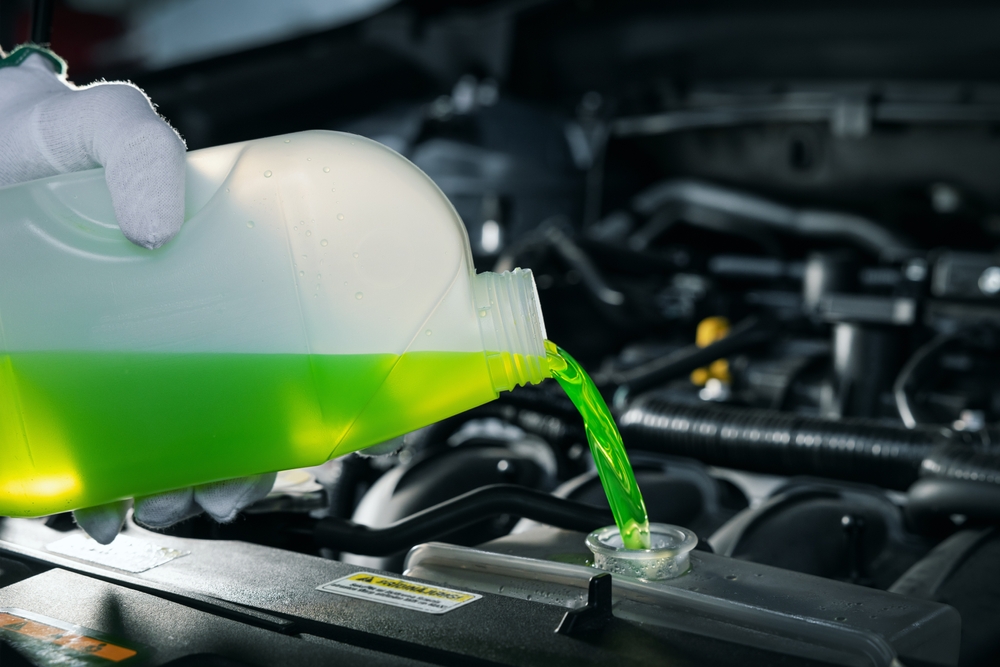When Tennessee’s summer heat cranks up to those sweltering 96°F days, your Ford’s cooling system becomes absolutely critical for keeping you moving safely down the road. Whether you’re navigating Franklin’s busy streets during rush hour or heading out for a weekend adventure, your F-150, Explorer, or Bronco needs a bulletproof cooling system to handle Tennessee’s intense heat and humidity. At Ford Lincoln of Franklin Service, we know exactly what your Ford needs to conquer those scorching summer months without breaking a sweat.
Why Tennessee Summers Demand a Bullet-Proof Cooling System
Franklin’s summer climate creates particularly demanding conditions for vehicle cooling systems, with average high temperatures reaching 89°F and heat indexes climbing well above 100°F when humidity peaks at 75%. Your Ford’s engine generates tremendous heat under normal conditions, but when you factor in stop-and-go traffic through Cool Springs or long drives toward Nashville, that heat becomes even more intense. Tennessee’s notorious summer humidity makes things worse by reducing your radiator’s ability to effectively dissipate heat, forcing your cooling system to work overtime.
The combination of steep grades along routes like Highway 96 and extended idling during summer traffic jams creates perfect storm conditions for overheating. According to automotive safety experts, engine overheating poses serious safety risks including potential engine seizure that can cause drivers to lose control. When your cooling system fails in Tennessee’s heat, you’re not just looking at an expensive repair bill—you’re facing a potentially dangerous situation that could leave you stranded on a busy highway with engine damage that easily runs into thousands of dollars.
Ford’s Cooling System 101: Key Components & What Goes Wrong
Your Ford’s cooling system is actually an intricate network of components working together to keep engine temperatures in the optimal range. The radiator acts as the primary heat exchanger, using airflow to cool hot coolant before it returns to the engine. The water pump circulates coolant throughout the system, ensuring consistent flow through the engine block and radiator. Your thermostat regulates coolant flow based on temperature, while cooling hoses transport fluids between components. Understanding these parts helps you recognize warning signs before they become expensive problems.
Ford’s cooling systems are specifically engineered to handle demanding conditions, but Tennessee’s extreme heat and humidity can accelerate wear on critical components. The water pump, driven by your engine’s timing belt or serpentine belt, can develop leaks or bearing failure over time. Thermostats can stick closed, preventing coolant circulation, or stick open, preventing your engine from reaching proper operating temperature. Radiator cores can become clogged with debris or develop internal corrosion that reduces cooling efficiency. When any of these components fail during a Tennessee summer, your engine temperature can spike dangerously fast, potentially causing permanent damage to expensive internal components like head gaskets or cylinder heads.
Top 5 Summer Cooling System Checks Every Ford Owner Must Do
Smart Ford owners perform these essential checks regularly to avoid getting stranded in Tennessee’s brutal summer heat. First, check your coolant level monthly when the engine is completely cool—never remove the radiator cap from a hot engine, as pressurized coolant can cause severe burns. Your coolant reservoir should show fluid between the “MIN” and “MAX” lines, and the coolant should appear clean and bright green, orange, or yellow depending on your Ford’s specifications. Dark, rusty, or contaminated coolant indicates it’s time for a complete system flush.
Second, inspect all visible cooling hoses for signs of deterioration, including cracks, bulges, or soft spots that indicate internal breakdown. Tennessee’s heat causes rubber hoses to deteriorate faster than normal, and a blown hose can leave you stranded instantly. Third, test your radiator by carefully feeling around the fins for bent or damaged areas and ensuring the radiator cap maintains proper pressure—a faulty cap can cause coolant loss and overheating. Fourth, check your water pump for leaks by looking for coolant stains or mineral deposits around the pump housing. Finally, verify that your cooling fans operate properly by running your air conditioning and observing that both fans spin when the AC is on.
Air Conditioning vs. Engine Cooling: Both Must Survive TN Heat
Many Ford owners don’t realize that their air conditioning system and engine cooling system are closely connected, especially during Tennessee’s sweltering summer months. Your AC condenser sits directly in front of your radiator, meaning both systems compete for the same airflow to dissipate heat. When your AC system develops problems like refrigerant leaks—which are common according to automotive service data—it forces your air conditioning to work harder, generating additional heat that your engine cooling system must handle.
Tennessee’s extreme heat puts tremendous strain on both systems simultaneously, which is why Ford Lincoln of Franklin Service recommends having both your engine cooling and air conditioning systems inspected together before summer arrives. Your AC system needs proper refrigerant levels, clean condenser fins, and functioning cooling fans to operate efficiently. When any of these components fail, your cabin won’t stay cool and your engine cooling system will struggle to maintain proper temperatures. Running your air conditioning periodically during cooler months helps maintain seal integrity and prevents costly repairs when summer heat arrives.
Common Cooling Issues in Ford Trucks & SUVs in TN
Ford trucks and SUVs face unique cooling challenges in Tennessee’s demanding climate, particularly models like the F-150, Explorer, and Bronco that frequently handle heavy loads or off-road adventures. The F-150’s larger engine bay and increased towing capacity mean more heat generation, while the Explorer’s compact engine compartment can trap heat during stop-and-go driving through Franklin’s busy areas. These vehicles often experience cooling issues related to their specific designs and typical usage patterns in Tennessee’s challenging environment.
Common problems include radiator fan failures that leave vehicles vulnerable during low-speed driving, thermostat malfunctions that prevent proper temperature regulation, and water pump failures that typically occur between 80,000-120,000 miles. Ford’s turbocharged engines, like those found in many F-150 models, generate additional heat that can stress cooling components beyond their design limits during extended highway driving in extreme heat. Professional diagnostics can identify these issues before they cause engine damage, saving you from expensive repairs and dangerous roadside emergencies.
Preventive Maintenance: Stay Ahead of Breakdowns
The smartest Ford owners follow a preventive maintenance schedule specifically designed for Tennessee’s harsh summer conditions. Start by following Ford’s recommended coolant flush intervals, typically every 100,000 miles or five years, but consider more frequent service if you frequently drive in extreme conditions. Quality coolant maintains proper pH levels and corrosion inhibitors that protect internal engine components from damage caused by Tennessee’s temperature extremes. Using the correct Ford-approved coolant mixture ensures optimal heat transfer and freeze protection.
Schedule cooling system inspections every spring before temperatures climb, allowing professional technicians to identify potential problems while they’re still minor and inexpensive to repair. Replace aging hoses and belts based on time rather than mileage, as Tennessee’s heat accelerates rubber deterioration regardless of how many miles you drive. Professional pressure testing can reveal small leaks before they become major failures, while radiator flushes remove harmful deposits that reduce cooling efficiency. Here’s an interesting tip: running your air conditioning for a few minutes each month during winter helps preserve AC seals and prevents expensive repairs when summer arrives.
When to Visit Ford Lincoln of Franklin for a Cooling System Check
Don’t wait for warning signs to schedule your cooling system service—proactive maintenance prevents roadside emergencies and expensive engine damage. Visit our expert technicians immediately if you notice any warning signs like rising temperature gauges, steam from under the hood, unusual coolant odors, or heating issues inside your cabin. Our factory-trained technicians use Ford-specific diagnostic equipment to identify problems that generic shops might miss, ensuring your repair is done right the first time.
Located conveniently in Franklin, our service center specializes in Ford cooling system maintenance and repair, with genuine Ford parts readily available for immediate installation. We understand Tennessee’s unique climate challenges and how they affect your specific Ford model, whether you drive a work truck that sees daily heavy use or a family SUV that needs reliable performance for weekend trips. Our comprehensive cooling system inspection includes pressure testing, thermostat function testing, coolant analysis, and radiator efficiency evaluation—services designed to keep your Ford running smoothly through the hottest Tennessee summer.
DIY Quick Checks: What You Can Do Before You Bring It In
Smart Ford owners can perform several basic checks to monitor their cooling system health and catch problems early. Start by checking your coolant level weekly during summer months—always when the engine is completely cool—and top off with the correct Ford-approved coolant mixture if needed. Look for obvious leaks by checking under your vehicle for puddles or stains, particularly after your Ford has been parked overnight. Green, orange, or yellow stains indicate coolant leaks that need immediate professional attention.
Listen for unusual noises like squealing belts or grinding sounds that might indicate water pump bearing failure or loose belt tensioners. Check your temperature gauge regularly while driving and immediately pull over safely if it moves toward the red zone—continuing to drive an overheating engine can cause catastrophic damage within minutes. However, remember that cooling system repairs involve pressurized systems and extremely hot components that can cause serious injury. While these simple checks help you monitor your system’s health, leave actual repairs to professional technicians who have the proper tools and safety equipment to work on your Ford’s cooling system safely.
Cooling System Component Comparison
| Component | Primary Function | Typical Lifespan | Failure Symptoms | Replacement Urgency |
|---|---|---|---|---|
| Radiator | Heat dissipation | 8-10 years | Overheating, visible leaks | High – engine damage risk |
| Water Pump | Coolant circulation | 80,000-120,000 miles | Leaks, grinding noise | Critical – immediate failure |
| Thermostat | Temperature regulation | 100,000 miles | Overheating or poor heating | High – engine protection |
| Cooling Hoses | Coolant transport | 60,000-100,000 miles | Bulging, cracking, leaks | Moderate – gradual failure |
| Radiator Cap | System pressurization | 5-7 years (whenever it fails) | Coolant loss, overheating | Low cost, high impact |
*Lifespans may vary based on driving conditions and maintenance. Tennessee’s extreme heat can accelerate component deterioration.
Tennessee Summer Driving Tips
Maximize your Ford’s cooling efficiency during Tennessee’s brutal summer heat with these proven strategies:
- Pre-cool your vehicle: Start your Ford and run the air conditioning for a few minutes before driving, allowing both cooling systems to stabilize before you hit the road.
- Monitor traffic conditions: Extended idling in summer traffic reduces airflow through your radiator—consider alternate routes during peak hours to keep moving and maintain cooling airflow.
- Use air recirculation wisely: Switch to fresh air mode during highway driving to reduce AC workload, but use recirculation in stop-and-go traffic to maintain cabin cooling efficiency.
- Watch for warning signs: Temperature gauge changes, unusual smells, or heating problems indicate cooling system issues that need immediate professional attention to prevent expensive engine damage.
- Keep emergency supplies: Carry extra coolant and distilled water for emergencies, but remember that adding cold liquid to an overheated engine can cause serious damage—always let the engine cool completely first.
Following these tips helps ensure your Ford handles Tennessee’s challenging summer conditions safely and reliably, whether you’re commuting through Franklin or exploring Tennessee’s scenic highways.
FAQs
Q: How often should I flush my Ford’s coolant system in Tennessee heat?
A: Ford recommends coolant system flushes every 100,000 miles or five years, but Tennessee’s extreme heat and humidity may necessitate more frequent service. Our technicians can test your coolant condition to determine the optimal replacement schedule for your specific driving conditions.
Q: Can low coolant cause engine shutdown in 100°F+ weather?
A: Absolutely. When coolant levels drop below minimum requirements, your engine can overheat rapidly in extreme heat, potentially causing automatic shutdown to prevent catastrophic damage. Low coolant is one of the fastest ways to destroy an engine during Tennessee summers.
Q: What mixture of antifreeze offers best protection in extreme heat?
A: Ford specifies exact coolant formulations for each model, typically a 50/50 mixture of approved coolant and distilled water. Using the correct Ford-approved coolant ensures optimal heat transfer, corrosion protection, and system compatibility for Tennessee’s demanding climate.
Q: Will neglected engine cooling damage my A/C system?
A: Yes, because both systems share airflow through your radiator and condenser. When engine cooling fails, it can cause air conditioning components to overheat and fail, turning a simple cooling problem into an expensive dual-system repair.
Q: How can I tell if my thermostat or water pump is failing?
A: Thermostat failure typically causes rapid overheating or poor cabin heating, while water pump failure often presents as coolant leaks or grinding noises from the engine bay. Both require immediate professional diagnosis to prevent expensive engine damage.
Q: Does running the A/C in winter help save summer repair costs?
A: Yes! Running your air conditioning monthly during cooler months maintains seal integrity and prevents refrigerant leaks, reducing the likelihood of expensive AC repairs when summer heat arrives.
Keep Your Ford Cool This Summer
Tennessee’s summer heat doesn’t have to mean expensive cooling system repairs or dangerous roadside breakdowns. With proper preventive maintenance and professional service from Ford Lincoln of Franklin, your Ford will handle even the hottest days with confidence. Our expert technicians understand exactly what your F-150, Explorer, or Bronco needs to conquer Tennessee’s challenging climate, using genuine Ford parts and factory-approved service procedures.
Don’t wait for warning signs—schedule your cooling system inspection today and drive with confidence all summer long.
Schedule Your Cooling System Service
We’re located at 1129 Murfreesboro Rd, Franklin, TN 37064



